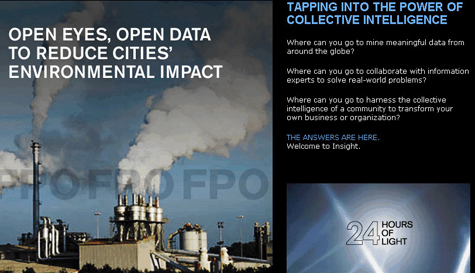Can Web 2.0 really save the planet?

Chad Hurley, the worldwide Web 2.0 video king, hailed before the U.S. Congress last week that his YouTube “community” is helping “children in Africa.”
BUT, can the entire Web 2.0 community save the WHOLE planet?
Business Objects, a self-described “pioneer in business intelligence since the dawn of the category,” believes the dawn of a new civilization is upon us, thanks to “our collective IQ being put to a higher purpose, solving the world’s great problems,” courtesy of an “Application Revolution.”To coincide with the C40 Large Cities Climate Summit under way in New York City, Business Objects is launching Insight (Insight.businessobjects.com), touted as an “exciting new online community dedicated to seeing what happens if data lovers, business thinkers, technologists, academics, visual artists and others put their brains together to discover new ways of sharing ideas, analyzing information, and working together in a global mind grid.”

First real-world issue up for collective resolution?
One of the biggest problems facing the planet today:Reducing our environmental impact on the world.
Can Business Objects really harness a “global mind grid” though, even if it is for a greater global good?
Insight may be a new age “green” friendly Web 2.0 community building platform, but it is “challenging” global minds the old fashioned way, with promises of the global currency: greenbacks.
I asked George Paolini, the lead architect of Insight, if the community efforts are for "the planet," why is the lure of monetary rewards necessary?The initial challenge is an environmental cause that is topical but there will others much more mundane to the average reader, but of heightened interest to the company or organization sponsoring the challenge and business analysts who love to solve tough problems.
The core of the Insights platform is the notion of a community “challenge,” to “move beyond transactional relationships, like MySpace and LinkedIn, to true collaboration”:
Think about a problem your organization faces, the big, intractable, Gordian knot one you’ve been unable to solve. When you’re ready to discuss, fill out a challenge submission form. We’ll be in touch to figure out how the Insight community can help.
The Insight leadership team reviews every challenge application individually. If a challenge is selected for feature consideration, we contact the organization to discuss working together to articulate the problem to the community and to publish the data the community will need to help solve the problem.
We will then post the “finalists” to the Insight community for ranking and the top vote getter will be “sponsored,” which means Insight will organize the challenge and post a financial reward for solving the problem.
For those challenge submissions that aren’t selected, don’t worry, you can still tap into the community for help. And, of course, you can always resubmit for sponsorship.
I asked Insight's Paolini how the Insight leadership team evaluates proposed challenges:
Challenges will be judged based on several factors, including the complexity of the problem to be solved--the more unique, the better, since this will provide a learning experience that we can then repurpose as a case study--the amount of data the company or organization can share, and the interest of the Insight community.
Monetary rewards will be “judged” by both Insight and the company or organization sponsoring the challenge.
Business Objects aims to not only save the planet via Insights though, it also seeks to “enlighten” businesses along the way.
In “Pursuing Business Enlightenment,” Timo Elliott, senior director of strategic marketing for Business Objects, responsible for evangelizing the use of business intelligence (BI) to major organizations worldwide, declares at the Insights blog:
In history, Age of Enlightenment thinkers were the first to believe that systematic, scientific thinking could be applied to all areas of human activity. We're living in the Age of Information, which has brought into existence vast amounts of data, but all too often only specialized acolytes with the right technical incantations have been able to coax out its benefits.
Business Objects is promoting “business enlightenment” to bring businesses “out of the Dark Ages”:
Most organizations around the world are still in the dark, struggling to get visibility into the essential trends that shape their daily business. But many are coming into the light, using information to transform the way they do business, becoming more efficient, better managed, and more competitive. They’re innovating by integrating their data, turning it into information, and delivering it widely across and beyond their organization.
People that lead successful BI projects to transform their businesses can rightfully be called heroes, Elliott asserts.
In Insights, Business Objects is up for some big challenges, solving the world’s problems and making the world’s corporate executives heroes.